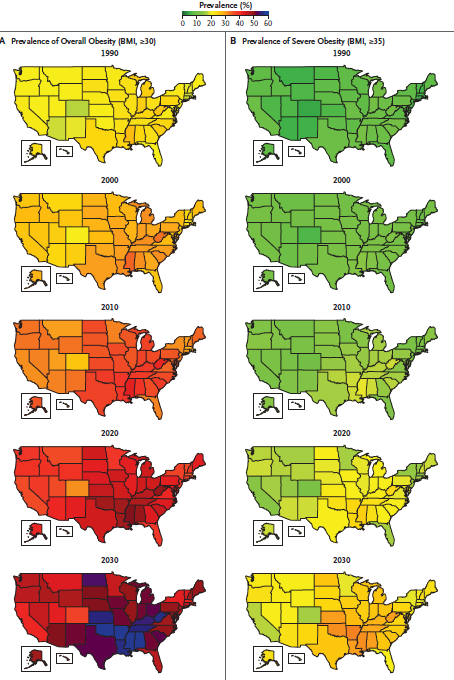Nearly half US residents to be 'obese' in 2030, 1 in 4 to have 'severe obesity,' study says
BOSTON – Waistlines of Americans continue to get wider, and unless habits change on a grand scale, obesity will soon be the norm.
Nearly half of the U.S. population is projected to be obese by 2030, and a quarter will struggle with severe obesity by that time, according to a new study from the Harvard T.H. Chan School of Public Health.
In 10 years, 29 states are projected to have majority populations that are obese, the study says, and all states will have populations that are at least 35% obese.
"Obesity is going up in terms of the number of people who have it, and the degree or severity of obesity is going up," said Zachary Ward, a Harvard programmer and analyst who served as lead author of the report published Thursday in The New England Journal of Medicine.
More: Obesity continues rise in USA, but these counties are the least obese in each state
Forty percent of Americans adults are obese, and 18% suffer from severe obesity. The study predicts those numbers will balloon by 2030 to 49% and 24% respectively.
Researchers predict severe obesity to be highest among women, non-Hispanic black adults and people who earn annual incomes below $50,000 per year. Among men, 21% are expected to be severely obese by 2030, compared with 28% of women.
"It used to be a rare condition," Ward said of the severe category, "but it's increasing."
State-Level Trends in Obesity with Zach Ward
Obesity versus severe obesity
Obesity is measured by body mass index, BMI, which is calculated by dividing a person's weight in kilograms by the square of their height in meters. A BMI of above 30 is considered obese; above 35 is considered severely obese, which typically means having 100 pounds or more of excess weight.
"People are at a much higher risk (with severe obesity) for diseases like diabetes, heart disease, some types of cancer and mortality as well," Ward said. "There's big health implications."
Obesity is expected to reach the highest levels in the South, which already leads the nation. Ward pointed to the South's higher populations of African Americans and low-income subgroups, which are both more likely to be obese.
States with the highest projected 2030 obesity rates are: Oklahoma, 58.4%; Alabama, Arkansas and Mississippi, 58.2%; West Virginia, 57.5%; and Louisiana, 57.2%.
The highest populations of severe obesity are projected to be in Arkansas, 32.6%; Oklahoma, 31.7%; and Mississippi, 31.7%.

States or districts with the lowest projected obesity rates are: District of Columbia, 35.3%; Colorado, 38.2%; Hawaii, 41.3%; California, 41.5%; Massachusetts, 42.3%; and New York, 42.8%.
Researchers conducted the study by reviewing data from 6.2 million people who took part in phone surveys on behavior risks carried out by the Centers for Disease Control and Prevention from 1993 to 2016.
People typically self-report greater height and lower weight than what's accurate. Ward said researchers compared self-reported figures with the actual measured statistics in each state. They used trends from that data to project obesity rates for specific states, income levels and sub-populations.
Although the Harvard study did not identify causes for the rapid spike in obesity, health experts say Americans eat more food high in calories and fat and exercise less as more work has shifted from outside to the desk.
"It's clear that we're not going to be able to treat our way out of this epidemic. Losing weight is difficult," Ward said. "It's hard for clinicians to treat obesity. I think prevention really has to be the key to combating this epidemic."
He said "real structural changes, policy changes" at the local, state and national level are needed to reverse the obesity trends.
"Individual behavior change has not worked so far. We've been talking about obesity and telling people to lose weight for years, but it keeps going up year after year."
Reach Joey Garrison and on Twitter @joeygarrison.
This article originally appeared on USA TODAY: Nearly half US residents to be 'obese' in 2030, Harvard study finds

